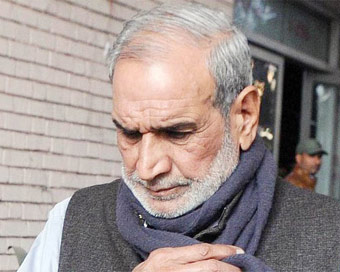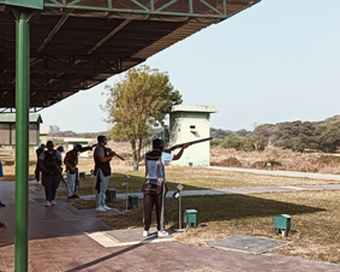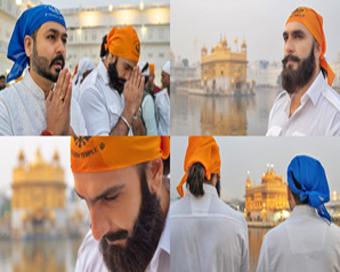 PM Modi visit USA
PM Modi visit USA Only the mirror in my washroom and phone gallery see the crazy me : Sara Khan
Only the mirror in my washroom and phone gallery see the crazy me : Sara Khan Karnataka rain fury: Photos of flooded streets, uprooted trees
Karnataka rain fury: Photos of flooded streets, uprooted trees Cannes 2022: Deepika Padukone stuns at the French Riviera in Sabyasachi outfit
Cannes 2022: Deepika Padukone stuns at the French Riviera in Sabyasachi outfit Ranbir Kapoor And Alia Bhatt's Wedding Pics - Sealed With A Kiss
Ranbir Kapoor And Alia Bhatt's Wedding Pics - Sealed With A Kiss Oscars 2022: Every Academy Award Winner
Oscars 2022: Every Academy Award Winner Shane Warne (1969-2022): Australian cricket legend's life in pictures
Shane Warne (1969-2022): Australian cricket legend's life in pictures Photos: What Russia's invasion of Ukraine looks like on the ground
Photos: What Russia's invasion of Ukraine looks like on the ground Lata Mangeshkar (1929-2022): A pictorial tribute to the 'Nightingale of India'
Lata Mangeshkar (1929-2022): A pictorial tribute to the 'Nightingale of India' PM Modi unveils 216-feet tall Statue of Equality in Hyderabad (PHOTOS)
PM Modi unveils 216-feet tall Statue of Equality in Hyderabad (PHOTOS)India Open Competition in Shotgun, organised by the National Rifle Association of India (N
- Hockey India names Amir Ali-led 20-man team for Junior Asia Cup
- Harmanpreet Singh named FIH Player of the Year, PR Sreejesh gets best goalkeeper award
- World Boxing medallist Gaurav Bidhuri to flag off 'Delhi Against Drugs' movement on Nov 17
- U23 World Wrestling Championship: Chirag Chikkara wins gold as India end campaign with nine medals
- FIFA president Infantino confirms at least 9 African teams for the 2026 World Cup
Delhi Hight Court sends Sajjan Kumar to jail life in 1984 anti-Sikh riots case Last Updated : 17 Dec 2018 12:52:13 PM IST 
Delhi HC convicts Sajjan Kumar in 1984 anti-Sikh riot case (File photo) The Delhi High Court on Monday held Sajjan Kumar and five others guilty in a 1984 anti-Sikh riot case and sentenced the Congress leader to imprisonment for the remainder of his natural life.
The court asked Sajjan Kumar to surrender by December 31.
A bench of Justice S. Muralidhar and Justice Vinod Goel overturned a trial court judgement that had acquitted the Congress leader.
"In the summer of 1947, during partition, this country witnessed horrific mass crimes where several lakhs of civilians, including Sikhs, Muslims and Hindus were massacred," the bench said.
"Thirty-seven years later, the country was again witness to another enormous human tragedy. Following the assassination of Indira Gandhi, the then Prime Minister of India, on the morning of October 31, 1984, by two of her Sikh bodyguards, a communal frenzy was unleashed."
"For four days between November 1 to November 4 of that year, all over Delhi, 2,733 Sikhs were brutally murdered. Their houses were destroyed. In the rest of the country too, thousands of Sikhs were killed," the bench observed in its 203-page order.
The court said: "A majority of the perpetrators of these horrific mass crimes, enjoyed political patronage and were aided by an indifferent law enforcement agency.
"The criminals escaped prosecution and punishment for over two decades.
"It took as many as 10 Committees and Commissions for the investigation into the role of some of them to be entrusted in 2005 to the Central Bureau of Investigation (CBI), 21 years after the occurrence."
The court convicted the Congress leader under various counts of Indian Penal Code (IPC) including murder, criminal conspiracy, wantonly giving provocation with intent to cause riot, mischief by fire or explosive substance with intent to destroy house and injuring or defiling place of worship with intent to insult the religion of any class.
The CBI had filed an appeal challenging the acquittal of Sajjan Kumar and said that the trial court "erred in acquitting Sajjan Kumar as it was he who had instigated the mob during the riots".
In October, the High Court reserved its order on the pleas challenging that trial court judgement on Sajjan Kumar but convicted the other five accused in the case related to the killing of five people in Delhi Cantonment area following the assassination of Indira Gandhi on October 31, 1984.
The HC Division Bench upheld the trial court April 30, 2013, judgement convicting five other accused -- former councillor Balwan Khokhar, former legislator Mahender Yadav, Krishan Khokar, Girdhari Lal and Retired Captain Bhagmal -- for their involvement in the case.
The five convicts have also filed appeals against their conviction.
Sajjan Kumar and five others were tried in the case involving the killing of five Sikhs -- Kehar Singh, Gurpreet Singh, Raghuvender Singh, Narender Pal Singh and Kuldeep Singh, who were members of the same family -- by a mob in Delhi Cantonment's Raj Nagar area following the assassination of Indira Gandhi on October 31, 1984.
The case against Sajjan Kumar and others was registered in 2005 on a recommendation by the Justice G.T. Nanavati Commission.
IANS For Latest Updates Please-
Join us on
Follow us on








172.31.16.186







